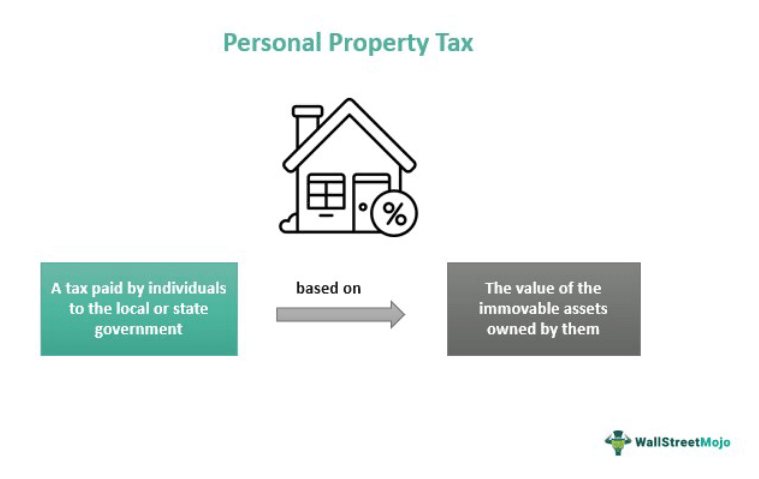Personal property and real estate taxes can often confuse new taxpayers. That said, understanding how they differ is essential for individuals to compute their tax liability accurately. So, let us look at the distinct characteristics of these two taxes in the table below.
Table Of Contents
What Is Personal Property Tax?
A personal property tax is a tax imposed by a local or state government on specific assets owned by the residents. Typically, governments utilize the taxes paid to fund public works projects, which include establishing healthcare facilities, constructing and maintaining roads, etc.

This tax is payable on movable assets or property, such as furnishings, vehicles, equipment, and more. Governments assess this tax based on value and location. Suppose an individual resides in a locality or state that levies such taxes. In that case, they must make the necessary property tax payment, or else the Internal Revenue Service or IRS imposes a penalty.
Key Takeaways
- The personal property tax definition refers to taxes payable to the local or state government on movable assets or personal properties. Such movable assets or personal properties include furniture, equipment, vehicles, etc.
- The personal property tax rate varies across states and localities in the U.S. The local or state governments update this tax rate periodically. They collect this tax to fund different public works projects.
- A crucial difference between personal property and real estate taxes is that the former is typically lower.
- Individuals must pay this tax within the due date to avoid paying penalty charges.
Personal Property Tax Explained
The personal property tax definition refers to the taxes levied on the value of movable assets, for example, vehicles and equipment owned by their residents. The rules related to this tax vary across the country as local or state governments impose it. Typically, such rules differ in terms of the following:
- Tax calculation process
- Which type of asset is subject to the tax
- How the funds raised from this tax are utilized
For instance, in Duval County, Florida, this tax is payable by the residents on every moveable asset that generates income. Hence, besides tools and equipment used in a business, such an asset may refer to furniture in a rental home. Therefore, if individuals residing in Duval County own such properties, they must a personal property tax return every year to report the property taxes owed by them.
In some states, for example, New York, one has to pay taxes only on real property. That said, the state or local governments may collect sales tax on personal assets at the time of purchase. Moreover, in the case of personal assets, such as motorcycles and automobiles, the state government may charge registration and license fees to earn revenue. In addition, transfer taxes by state can further vary, influencing the overall cost of asset ownership.
One must note that governments update the personal property tax rate periodically and reassess the asset values. As a result, individuals’ tax bills rise or fall every year.
Examples
Let us look at a few personal property tax examples to understand the concept better.
Example #1
Fairfax County’s Board of Supervisors approved changes in June 2022 to make personal property tax return filing easier for residents who move into the county or purchase a new automobile. From January 2023, Fairfax County will automatically file tax returns for such residents, thus making the nation’s tax system much more effective and efficient. This step taken by the Board of Supervisors will benefit roughly 133,000 vehicle owners annually.
Example #2
Suppose Sam is a resident of Oregon, where the state government values personal properties at 100% of the real market value. Since he owns taxable personal properties, he must ensure to file a tax return by March 15 every year. After filing the return, Sam will receive a property tax statement by the end of October. He must pay a minimum of one-third of his tax liability by November 15 to avoid paying any late fee. If he chooses to pay the full amount due by that date, he will be eligible for a 3% discount on the bill.
Personal Property Tax Deduction
Individuals making a personal property tax payment can claim a deduction against it by itemizing on Schedule A of their federal tax return. Previously, there was no limit to this deduction. However, after introducing the U.S. Tax Cuts and Jobs Act (TCJA), individuals are eligible for a deduction of up to $10,000 against such tax payments.
On the other hand, married taxpayers filing separate tax returns can claim a maximum deduction of $5,000 for each tax return.
Personal Property Tax vs Real Estate Tax
| Basis Of Comparison | Personal Property Tax | Real Estate Tax |
|---|---|---|
| 1. Tax Rate | The tax rate is lower than real estate taxes. | The tax rate is higher. |
| 2. Deduction Amount | The deduction received against tax payment is typically lower. | The deduction received against real estate tax payment is typically higher as the value of one’s home is usually higher than any personal property. |
| 3. Levied On | This tax is payable on movable assets like vehicles, equipment, etc. | Individuals pay this tax on the value of their homes. |
